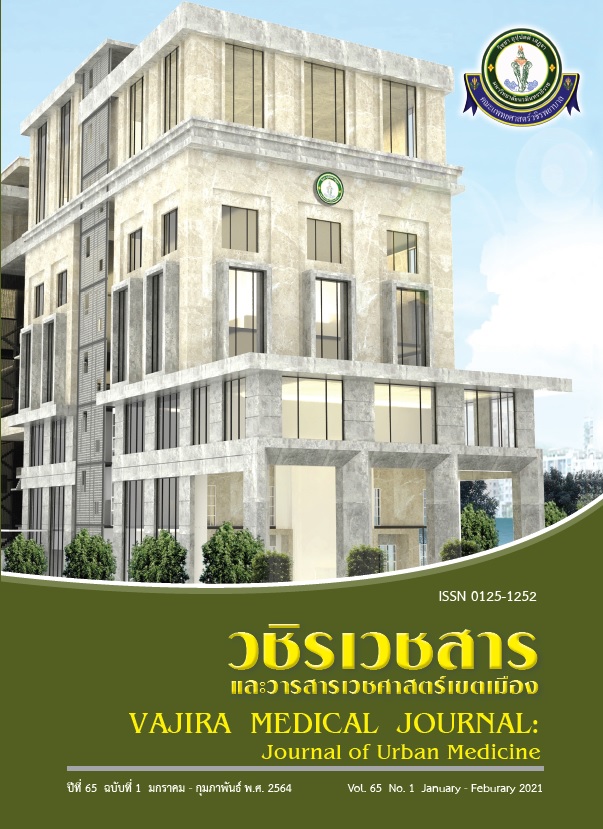Correlation between TSH Receptor Antibody Level with Vitamin D Level and Thyroid Hormones in Patients with Graves’ Disease
Main Article Content
Abstract
Objectives: 1. To investigate the relationship between the levels of TSH receptor antibody (TRAb) and the levels of vitamin D in the patients with newly diagnosis of Graves’ Disease (GD) and relapsed GD. 2. To investigate the relationship between the levels of TSH receptor antibody (TRAb) and the levels of Thyroid hormone in the patients with newly diagnosis of Graves’ Disease (GD) and relapsed GD.
Methods: This is a cross-sectional study in the Faculty of Medicine Vajira Hospital, Navamindradhiraj University. The eligible patients with newly diagnosed and relapsed GD from April 1st, 2018 to January 31st, 2019 were enrolled. The correlation of TRAb with vitamin D 25(OH)D and thyroid hormones was analyzed by using Pearson correlation.
Results: A total of 59 patients was divided into first diagnosed 29 patients, and relapsed GD 30 patients. There was no significant correlation between the TRAb levels and the vitamin D levels in the first diagnosis of GD (r = -0.148, p=0.266) and relapsed disease (r = -0.132, p = 0.488). We found weak correlation between the levels of TRAb and FT4 (r = 0.264, p = 0.043) and also found weak correlation between the levels of TRAb and FT3 (r = 0.379, p = 0.003). Nevertheless, the significant correlation between the levels of TRAb and FT4 (r = 0.504, p = 0.005) and the significant correlation between the levels of TRAb and FT3 (r = 0.555, p = 0.002) were found only in the newly diagnosis patients.
Conclusions: There was no significant correlation between the TRAb levels and the vitamin D levels in the patients with newly diagnosis and relapsed GD. However, the levels of TRAb significantly showed moderate statistical correlation between the levels of FT4 and FT3 in the patient with newly diagnosed Grave’s disease.
Downloads
Article Details
References
Girgis CM, Champion BL, Wall JR. Current concepts in graves' disease. Ther Adv Endocrinol Metab 2011;2(3):135-44.
Smith TJ, Hegedus L. Graves' Disease. N Engl J Med 2016;375(16):1552-65.
Quadbeck B, Hoermann R, Roggenbuck U, Hahn S, Mann K, Janssen OE, et al. Sensitive thyrotropin and thyrotropin-receptor antibody determinations one month after discontinuation of antithyroid drug treatment as predictors of relapse in Graves' disease. Thyroid 2005;15(9):1047-54.
Tozzoli R, Bagnasco M, Giavarina D, Bizzaro N. TSH receptor autoantibody immunoassay in patients with Graves' disease: improvement of diagnostic accuracy over different generations of methods. Systematic review and meta-analysis. Autoimmun Rev 2012;12(2):107-13.
Barbesino G, Tomer Y. Clinical review: Clinical utility of TSH receptor antibodies. J Clin Endocrinol Metab 2013;98(6):2247-55.
Hesarghatta Shyamasunder A, Abraham P. Measuring TSH receptor antibody to influence treatment choices in Graves' disease. Clin Endocrinol (Oxf) 2017;86(5):652-7.
Xu MY, Cao B, Yin J, Wang DF, Chen KL, Lu QB. Vitamin D and Graves' disease: a meta-analysis update. Nutrients 2015;7(5):3813-27.
Zhang H, Liang L, Xie Z. Low Vitamin D Status is Associated with Increased Thyrotropin-Receptor Antibody Titer in Graves Disease. Endocr Pract 2015;21(3):258-63.
Agmon-Levin N, Theodor E, Segal RM, Shoenfeld Y. Vitamin D in systemic and organ-specific autoimmune diseases. Clin Rev Allergy Immunol 2013;45(2):256-66.
Antico A, Tampoia M, Tozzoli R, Bizzaro N. Can supplementation with vitamin D reduce the risk or modify the course of autoimmune diseases? A systematic review of the literature. Autoimmun Rev 2012;12(2):127-36.
Pitocco D, Crino A, Di Stasio E, Manfrini S, Guglielmi C, Spera S, et al. The effects of calcitriol and nicotinamide on residual pancreatic beta-cell function in patients with recent-onset Type 1 diabetes (IMDIAB XI). Diabet Med 2006;23(8):920-3.
Ahn HY, Chung YJ, Cho BY. Serum 25-hydroxyvitamin D might be an independent prognostic factor for Graves disease recurrence. Medicine (Baltimore) 2017;96(31):e7700.


